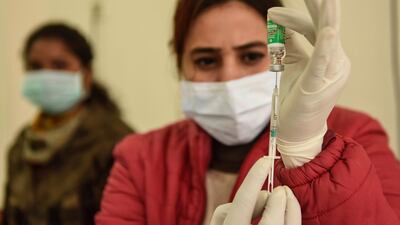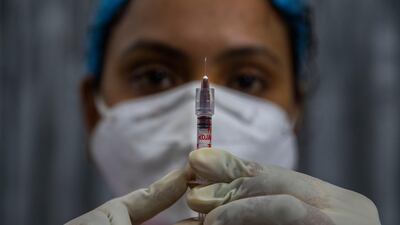India’s ambitious coronavirus vaccination drive is falling victim to a growing mistrust with almost half of beneficiaries skipping their shots over fears of side effects, technical glitches and expectations of an ebbing pandemic.
Prime Minister Narendra Modi launched the world's biggest vaccination drive on January 16 to inoculate 300 million vulnerable people from the 1.4 billion population in the nation hit second-hardest worldwide by the pandemic, with 10.6 million confirmed cases and 153,000 deaths from Covid-19.
But 10 days into the drive, many vaccination centres nationwide are witnessing a shortfall in anticipated turnout from priority groups, at times receiving only half of the expected numbers, as doctors, nurses and other key frontline workers avoid taking the shots.
The government said so far about 2 million people have taken the Covid-19 vaccines, a shortfall of about 1.6 million from the stipulated target of immunising 300,000 people per day.
The current drive, which is targeting healthcare and frontline workers at hospitals, is scheduled to be expanded to 270 million people aged 50 years and above, and those with comorbidities by the end of July. But experts say the government's controversial approval of the locally developed Covaxin vaccine and a slowing pandemic has triggered suspicion and hesitancy.
“I don’t want to take a risk at this stage as many things remain unclear, including the efficacy of the vaccines,” said Manish Sharma, a hospital employee in Noida city, near Delhi.
“I can safely wait for some more time,” Mr Sharma said.
India in early January gave emergency-use approval to two vaccines, Covishield by the Serum Institute of India, which was developed by the Oxford-AstraZeneca partnership in the UK, and India-based Bharat Biotech’s home-grown Covaxin, whose efficacy is yet to be determined as it is still undergoing human trials. Both are made in India.
Many scientists and medical practitioners had expressed their dismay over the government’s decision to rush through approval of Covaxin and warned this could spark public distrust.
Some members of the scientific community felt the absence of efficacy data from local trials of the AstraZeneca vaccine was also a concern, despite it being approved by UK trials and administered in several countries worldwide when it was released in India.
Reports of side effects and the deaths of several vaccine recipients have also compounded concerns surrounding the safety of the vaccines.
Over the past week, at least nine recipients have died after taking the shots, although the government has confirmed that the deaths were unrelated to the vaccines and termed about 1,200 cases of adverse health events as normal.
"The premature approval has really affected the roll-out and trust in the vaccine," Dr Sulakshana Nandi, National Joint Convener of People's Health Movement, India, told The National.
“This could have been avoided… it is completely the government’s doing. The government should have waited a few more weeks for the efficacy data,” said Dr Nandi.
Several doctors’ associations have publicly raised questions over the government’s approval of Covaxin, which is being administered in government-run hospitals in 12 states.
Concern is now mounting that low turnout for the vaccine from priority groups, particularly the medical community, will fuel doubts among ordinary citizens that may undermine the programme’s reach and effectiveness.
Slow uptake has also left some vaccination centres with surplus supply. Excess doses have to be destroyed as they can only be used within six hours of opening the vial.
India has a strong record historically in conducting vaccination campaigns, including the complete eradication of polio following a robust immunisation programme.
A survey conducted by LocalCircles, a community social media platform, from January 16-18 found that 59 per cent of Indians were hesitant to take the vaccine, largely owing to the belief that the pandemic was ending on its own and raising suspicions over the ruling class excluding themselves from the drive until it had been tested on the wider population.
Social media messaging platforms such as Facebook and WhatsApp are being used to amplify misinformation about the vaccines, including misleading videos that purport to show doctors pretending to take the shots.
The shortfall has prompted the government to launch an awareness blitz and issue warnings to deal with those spreading false information.
"Indian scientists have done their duty by developing the coronavirus vaccine and now we have to fulfil ours," Prime Minister Narendra Modi said. "We have to defeat through the right information every network spreading lies and rumours.”
Several state health campaigns show prominent medical experts taking the vaccines and alerting people to misinformation spread by the "infodemic" while hospitals have started conducting awareness sessions for their healthcare workers to remove misconceptions.
Daily infection rate in India hase dropped sharply in recent weeks to about 15,000 from a peak of nearly 100,000 in September, prompting a mass sense of relief and complacency. On Tuesday, the country recorded 9,100 positive cases, the lowest in eight months.
The government has also used the export of vaccines to Brazil and several neighbouring countries to drive a point home about the quality of vaccines.
Jayaprakash Muliyil, a leading Indian epidemiologist, said he had trust in the vaccines though he questioned the timing of its launch when India's cases were dwindling.
"The problem with Covaxin is that the analysis hasn't come out and they have released it under the pretext of an emergency but there is no emergency and that is not fair," Mr Muliyil told The National.
“But I believe vaccines are good because theoretically it can give you the same protection… I might take the shot though I will wait for the data for Covaxin to come.”












